Back to Page
Seller News
Amazon News Roundup for Sellers
Amazon News Roundup for Sellers


Back to Page
Seller News
Amazon News Roundup for Sellers

The fourth quarter has officially begun, and it’s time for sellers to start implementing their Q4 strategies and tactics to get their fair share of the holiday pie. Amazon, too, has been making a lot of changes in its advertising console, introducing new features to ensure you get the best ROI for every dollar spent. Continue reading our monthly updates blog to catch up on all the Amazon advertising updates.
#1: Amazon Attribution will move to the Advertising Console
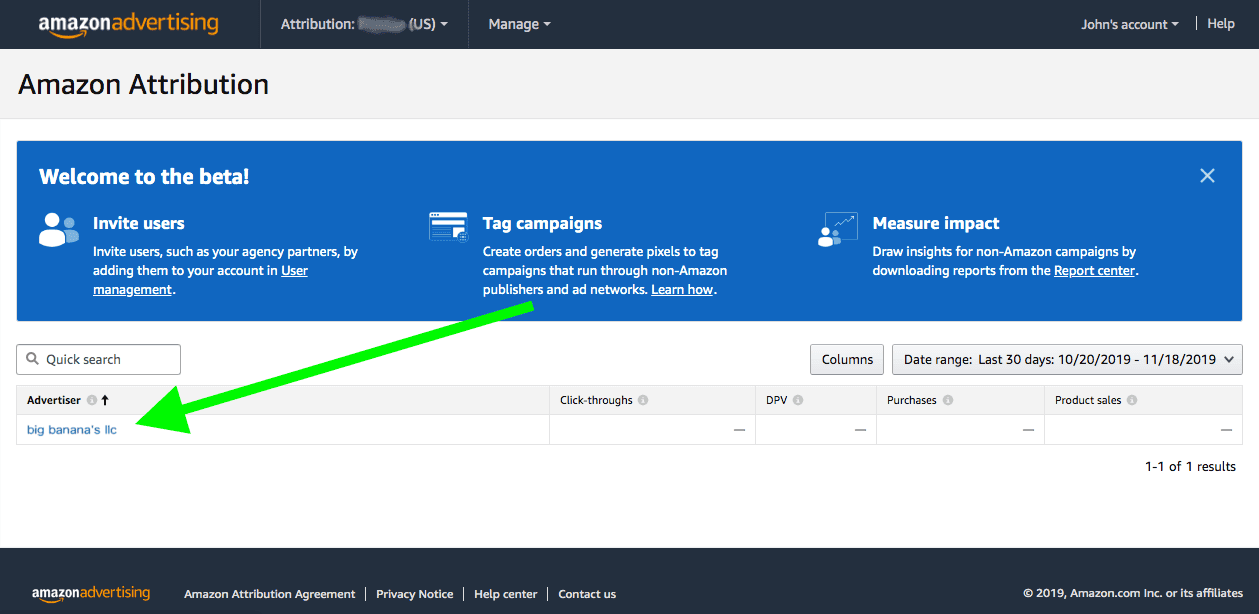
The Amazon Attribution dashboard will be moved to the Advertising console. By the end of this year, you will see Amazon Attribution alongside other self-service advertising products, including Amazon Sponsored Ads and Stores. With this launch, Amazon Attribution will also feature an in-console reporting dashboard and improved setup and implementation. However, as a part of this launch, Amazon Attribution will only support click-based conversion measurement for campaigns that are direct to on-Amazon landing pages.
#2: New Placements for Amazon Posts
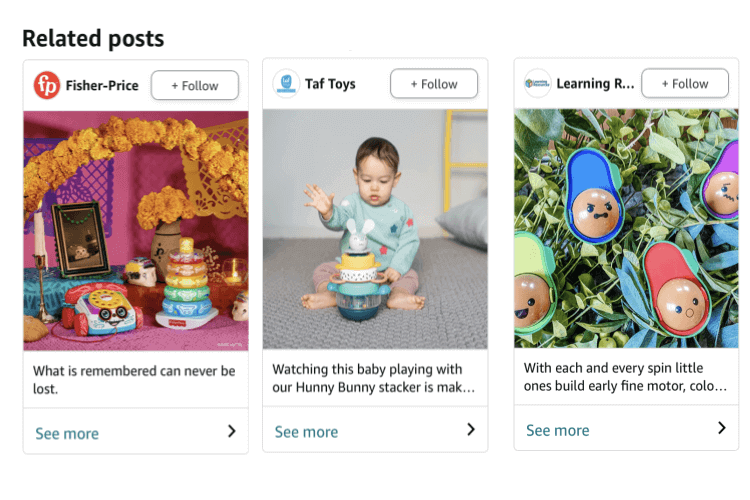
Along with the Amazon seller storefront, the related posts carousel on product detail pages, and relevant feeds, Posts will now also appear on your product page, right where shoppers are considering your product for purchase. To be eligible for this test placement, you just need 10 live Posts that follow Amazon content guidelines. Follow these tips to ensure your posts follow Amazon’s content quality guidelines:
Use lifestyle images that show your product in use or a visually attractive backdrop.
Avoid using collages or crowded images, and instead, use a single image focused on your product.
Remove any text, buttons, or icons from your image as they don’t meet Amazon’s accessibility standards.
#3: Brand Metrics introduced in the Advertising Console

Brand Metrics beta provides category wise performance insights that can help you understand how your brand engages with shoppers over time. Get a list of categories in which you have shoppers, the total number of shoppers associated with each category, the conversion ratio in each category, % of sales new to the brand, and more. A glance at the Brand Metrics dashboard can help you identify categories that are performing well and categories that need work.
#4: Storage Limits update (for Australia only)

From September 1, 2021, the FBA storage limit for sellers selling in Australia will be adjusted based on your Inventory Performance Index (IPI) score, historical sales volume, and available fulfillment center capacity. Sellers who maintain their IPI score at or above the required threshold will not be subject to storage limits for standard-size or oversized items. Sellers who do not have an IPI score (such as new sellers who have been active for less than 90 days or sellers without inventory at a fulfillment center) will receive 3,000 standard units and 300 oversized units. If you find yourself too busy or overwhelmed to keep a check on your inventory and IPI score, you can always hire our Amazon seller consultant to ensure that you stay on the right side of the IPI bar.
#5: Advertising on Twitch is now easy with Sponsored Display Ads
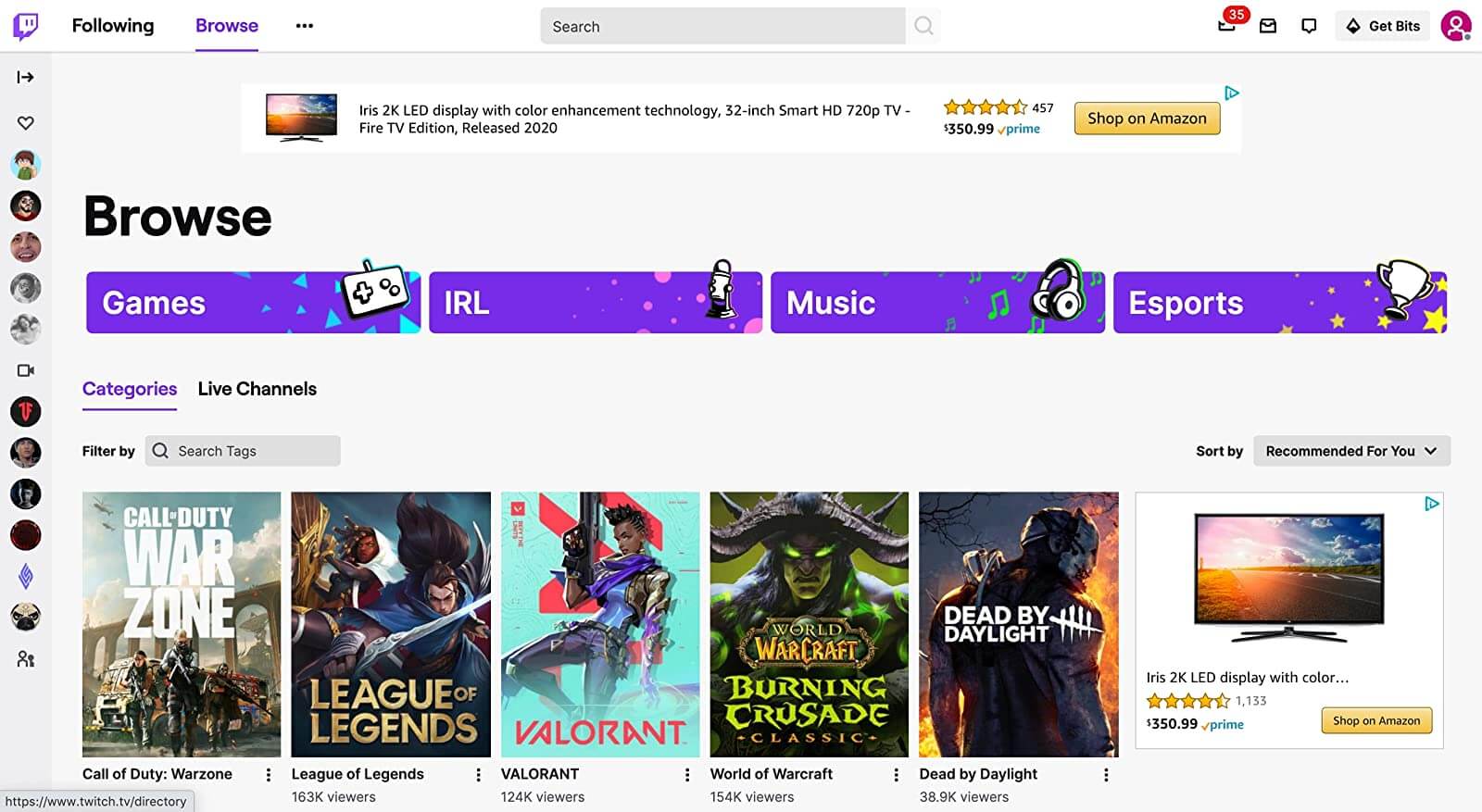
Advertisers can reach shoppers on the Twitch browse and display pages with a Sponsored Display audiences campaign. Twitch world's leading live streaming platform and global community for gaming, entertainment, music, sports, and more, in the US, CA, FR, IT, DE, ES, and the UK.
This is the first time Amazon has introduced off-Amazon placement for an Amazon Sponsored Ad. Advertisers can reach shoppers who have visited their product detail pages, the detail pages of similar products (competitors), or any relevant category on Amazon but haven’t made a purchase.
Where is the feature available?
North America: United States, Canada
Europe: United Kingdom, Germany, France, Italy, Spain
How to create a Sponsored Display audience campaign
1. When creating a Sponsored Display campaign, select “Audiences” as your targeting tactic
2. Choose your audiences by expanding the “Amazon audiences” option
3. When addressing your audiences, Twitch options will automatically populate under “Entertainment”
#6: Targeting Page launched in the Advertising Console

The Targeting page features a complete list of all targets across your automatic, keyword, product, and audience targets for your Sponsored Products and Sponsored Display campaigns. Advertisers can view the top and bottom performing targets as well as the delivery and performance metrics for each target. A glance at the targeting page allows you to analyze and optimize all of your targets from a single page. Previously this was done by navigating to individual campaigns and ad groups.
To access the targeting page, open your advertising console, navigate to the All Campaigns page and you will find the Targeting page next to the Management, Drafts, Settings, and History tabs.
#7: Budget Rules Launched in Sponsored Product Campaigns
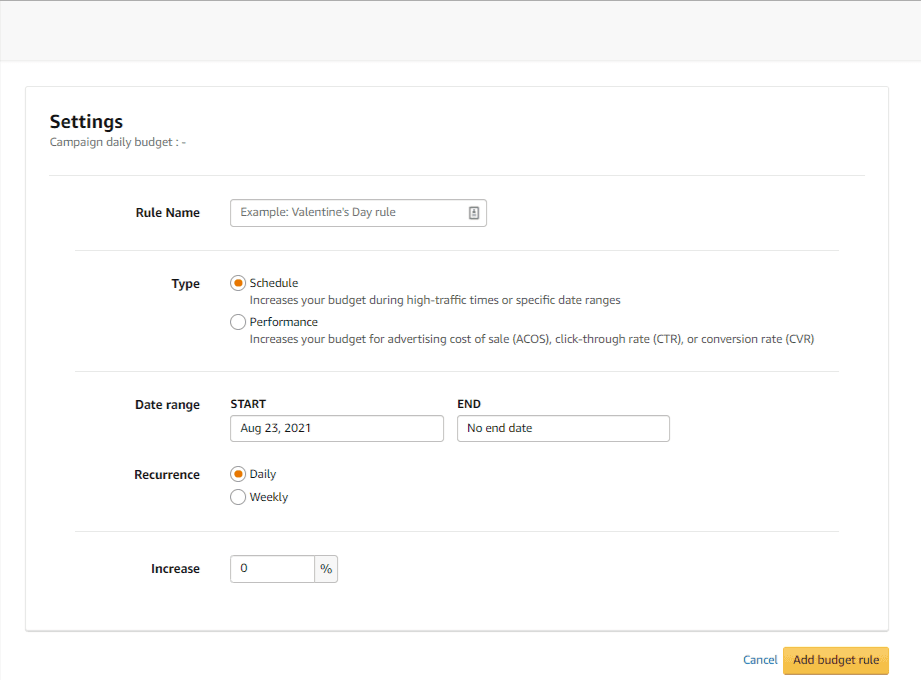
Budget rules allow advertisers to set their budget specifications in advance. For example, they can set rules to increase the daily campaign budget for sales events like Prime Days or on the weekends to ensure that their campaign doesn’t go out of budget. Budget rules help reduce manual effort spent on adjusting your campaign budgets, reduce the likelihood of missed sales opportunities, and give more control over the budget.
There are two types of budget rules you can select from:
Schedule-based rules allow you to set rules to increase the daily budget on scheduled events like Prime Day, Black Friday, or a custom period. This rule increases campaign budgets by the percentage specified in the rule.
Performance-based rules allow you to set rules to increase your campaign budgets only when your campaigns meet a certain performance threshold. The thresholds are measured using performance metrics such as ACOS, CTR, and conversion rate.
#8: Budget Page launched in the Advertising Console
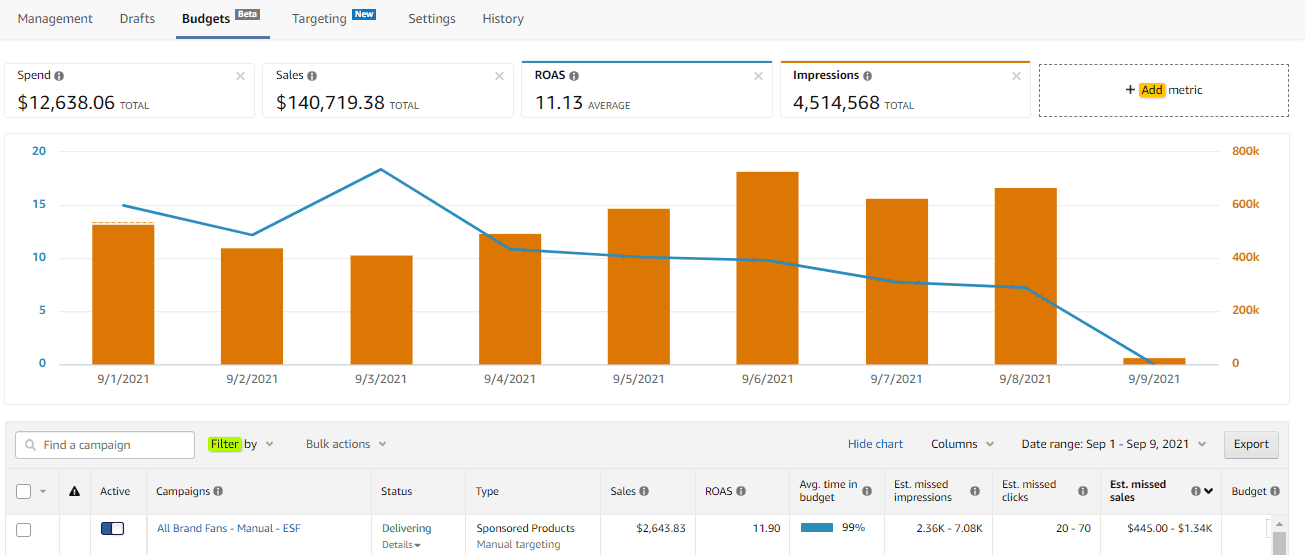
The budgets page provides powerful data points and performance insights that help minimize the chance of your campaign running out of budget. The page features brand new estimated “missed” metrics about your launched campaigns which are estimates of the potential your campaign could have achieved if stayed within the budget for longer. These metrics include missed impressions, estimated missed clicks, estimated missed sales, and recommended budgets.
#9: Four new certifications added to the Climate Pledge Friendly Program

The Climate Pledge Friendly Program helps customers spot and shop for sustainable products. The products that are enrolled in this program and are eligible get a Climate Pledge Friendly badge which makes it easy to identify them in the search result pages. Today more than 75,000 products across the U.S. and Europe are seen flaunting this coveted badge. The products are also featured on a dedicated storefront (Link) where shoppers can browse through various categories and shop for “green and clean” products.
Amazon has recently added four new certifications, including EWG Verified, EPA Safer Choice, Regenerative Organic Certification, and Animal Welfare Approved. If any of your products are eligible for the Climate Friendly Pledge program, be sure to enroll and apply for the badges.
#10: Amazon makes it easier for the sellers to resell customer-returned items or overstock inventory (for UK sellers only)

Amazon has introduced two new programs that will help sellers get rid of excess inventory sitting in FBA warehouses. According to Amazon, these programs are launched to ensure that “products sold on Amazon go to good use and don’t become waste.” It is an effort by the retail giant to create a circular economy. Once fully rolled out, these programs are expected to give more than 300 million products a second life each year.
FBA Liquidations gives sellers the option to Amazon’s existing wholesale liquidation partners and technology to prevent potential loss on returned and overstock items. The program is now live in the U.S., Germany, France, Italy Spain, and soon the UK.
Sellers selling in the UK can take advantage of FBA Grade and Resell, where they can sell returned products on Amazon as used items instead of having the items sent back to them or donated. It will be available in the U.S. by the end of the year and in Germany, France, Italy and Spain by early 2022.
#11: Shopify has removed its Amazon integration function
From September 20, sellers will now have to rely on 3rd party plugins to integrate their Amazon account with Shopify. Shopify has removed its Amazon integration function and developed new partner apps that will continue to reliably import and fulfill Amazon orders in Shopify. With these new apps, sellers can:
Sync all order information within Shopify in real-time
Create listings in all available Amazon categories
Edit listings individually and in bulk within Shopify
Staying updated is as easy as reading weekly blogs
There are so many updates going on within the Amazon ecosystem every day; it’s hard to keep up. But with our monthly updates blog, you can stay on top of all Amazon developments and changes. Every month we round up the most essential and need-to-know updates for and relating to Amazon sellers. Check-in here every month and catch up on what’s making news on Amazon lately.
There’s more. Amazon Consultants at eStore Factory collect all the need-to-know updates that concern you as a seller and we post them on our Amazon Seller News page. Bookmark this page and return every week to stay updated.
The fourth quarter has officially begun, and it’s time for sellers to start implementing their Q4 strategies and tactics to get their fair share of the holiday pie. Amazon, too, has been making a lot of changes in its advertising console, introducing new features to ensure you get the best ROI for every dollar spent. Continue reading our monthly updates blog to catch up on all the Amazon advertising updates.
#1: Amazon Attribution will move to the Advertising Console

The Amazon Attribution dashboard will be moved to the Advertising console. By the end of this year, you will see Amazon Attribution alongside other self-service advertising products, including Amazon Sponsored Ads and Stores. With this launch, Amazon Attribution will also feature an in-console reporting dashboard and improved setup and implementation. However, as a part of this launch, Amazon Attribution will only support click-based conversion measurement for campaigns that are direct to on-Amazon landing pages.
#2: New Placements for Amazon Posts

Along with the Amazon seller storefront, the related posts carousel on product detail pages, and relevant feeds, Posts will now also appear on your product page, right where shoppers are considering your product for purchase. To be eligible for this test placement, you just need 10 live Posts that follow Amazon content guidelines. Follow these tips to ensure your posts follow Amazon’s content quality guidelines:
Use lifestyle images that show your product in use or a visually attractive backdrop.
Avoid using collages or crowded images, and instead, use a single image focused on your product.
Remove any text, buttons, or icons from your image as they don’t meet Amazon’s accessibility standards.
#3: Brand Metrics introduced in the Advertising Console

Brand Metrics beta provides category wise performance insights that can help you understand how your brand engages with shoppers over time. Get a list of categories in which you have shoppers, the total number of shoppers associated with each category, the conversion ratio in each category, % of sales new to the brand, and more. A glance at the Brand Metrics dashboard can help you identify categories that are performing well and categories that need work.
#4: Storage Limits update (for Australia only)

From September 1, 2021, the FBA storage limit for sellers selling in Australia will be adjusted based on your Inventory Performance Index (IPI) score, historical sales volume, and available fulfillment center capacity. Sellers who maintain their IPI score at or above the required threshold will not be subject to storage limits for standard-size or oversized items. Sellers who do not have an IPI score (such as new sellers who have been active for less than 90 days or sellers without inventory at a fulfillment center) will receive 3,000 standard units and 300 oversized units. If you find yourself too busy or overwhelmed to keep a check on your inventory and IPI score, you can always hire our Amazon seller consultant to ensure that you stay on the right side of the IPI bar.
#5: Advertising on Twitch is now easy with Sponsored Display Ads

Advertisers can reach shoppers on the Twitch browse and display pages with a Sponsored Display audiences campaign. Twitch world's leading live streaming platform and global community for gaming, entertainment, music, sports, and more, in the US, CA, FR, IT, DE, ES, and the UK.
This is the first time Amazon has introduced off-Amazon placement for an Amazon Sponsored Ad. Advertisers can reach shoppers who have visited their product detail pages, the detail pages of similar products (competitors), or any relevant category on Amazon but haven’t made a purchase.
Where is the feature available?
North America: United States, Canada
Europe: United Kingdom, Germany, France, Italy, Spain
How to create a Sponsored Display audience campaign
1. When creating a Sponsored Display campaign, select “Audiences” as your targeting tactic
2. Choose your audiences by expanding the “Amazon audiences” option
3. When addressing your audiences, Twitch options will automatically populate under “Entertainment”
#6: Targeting Page launched in the Advertising Console

The Targeting page features a complete list of all targets across your automatic, keyword, product, and audience targets for your Sponsored Products and Sponsored Display campaigns. Advertisers can view the top and bottom performing targets as well as the delivery and performance metrics for each target. A glance at the targeting page allows you to analyze and optimize all of your targets from a single page. Previously this was done by navigating to individual campaigns and ad groups.
To access the targeting page, open your advertising console, navigate to the All Campaigns page and you will find the Targeting page next to the Management, Drafts, Settings, and History tabs.
#7: Budget Rules Launched in Sponsored Product Campaigns

Budget rules allow advertisers to set their budget specifications in advance. For example, they can set rules to increase the daily campaign budget for sales events like Prime Days or on the weekends to ensure that their campaign doesn’t go out of budget. Budget rules help reduce manual effort spent on adjusting your campaign budgets, reduce the likelihood of missed sales opportunities, and give more control over the budget.
There are two types of budget rules you can select from:
Schedule-based rules allow you to set rules to increase the daily budget on scheduled events like Prime Day, Black Friday, or a custom period. This rule increases campaign budgets by the percentage specified in the rule.
Performance-based rules allow you to set rules to increase your campaign budgets only when your campaigns meet a certain performance threshold. The thresholds are measured using performance metrics such as ACOS, CTR, and conversion rate.
#8: Budget Page launched in the Advertising Console

The budgets page provides powerful data points and performance insights that help minimize the chance of your campaign running out of budget. The page features brand new estimated “missed” metrics about your launched campaigns which are estimates of the potential your campaign could have achieved if stayed within the budget for longer. These metrics include missed impressions, estimated missed clicks, estimated missed sales, and recommended budgets.
#9: Four new certifications added to the Climate Pledge Friendly Program

The Climate Pledge Friendly Program helps customers spot and shop for sustainable products. The products that are enrolled in this program and are eligible get a Climate Pledge Friendly badge which makes it easy to identify them in the search result pages. Today more than 75,000 products across the U.S. and Europe are seen flaunting this coveted badge. The products are also featured on a dedicated storefront (Link) where shoppers can browse through various categories and shop for “green and clean” products.
Amazon has recently added four new certifications, including EWG Verified, EPA Safer Choice, Regenerative Organic Certification, and Animal Welfare Approved. If any of your products are eligible for the Climate Friendly Pledge program, be sure to enroll and apply for the badges.
#10: Amazon makes it easier for the sellers to resell customer-returned items or overstock inventory (for UK sellers only)

Amazon has introduced two new programs that will help sellers get rid of excess inventory sitting in FBA warehouses. According to Amazon, these programs are launched to ensure that “products sold on Amazon go to good use and don’t become waste.” It is an effort by the retail giant to create a circular economy. Once fully rolled out, these programs are expected to give more than 300 million products a second life each year.
FBA Liquidations gives sellers the option to Amazon’s existing wholesale liquidation partners and technology to prevent potential loss on returned and overstock items. The program is now live in the U.S., Germany, France, Italy Spain, and soon the UK.
Sellers selling in the UK can take advantage of FBA Grade and Resell, where they can sell returned products on Amazon as used items instead of having the items sent back to them or donated. It will be available in the U.S. by the end of the year and in Germany, France, Italy and Spain by early 2022.
#11: Shopify has removed its Amazon integration function
From September 20, sellers will now have to rely on 3rd party plugins to integrate their Amazon account with Shopify. Shopify has removed its Amazon integration function and developed new partner apps that will continue to reliably import and fulfill Amazon orders in Shopify. With these new apps, sellers can:
Sync all order information within Shopify in real-time
Create listings in all available Amazon categories
Edit listings individually and in bulk within Shopify
Staying updated is as easy as reading weekly blogs
There are so many updates going on within the Amazon ecosystem every day; it’s hard to keep up. But with our monthly updates blog, you can stay on top of all Amazon developments and changes. Every month we round up the most essential and need-to-know updates for and relating to Amazon sellers. Check-in here every month and catch up on what’s making news on Amazon lately.
There’s more. Amazon Consultants at eStore Factory collect all the need-to-know updates that concern you as a seller and we post them on our Amazon Seller News page. Bookmark this page and return every week to stay updated.
The fourth quarter has officially begun, and it’s time for sellers to start implementing their Q4 strategies and tactics to get their fair share of the holiday pie. Amazon, too, has been making a lot of changes in its advertising console, introducing new features to ensure you get the best ROI for every dollar spent. Continue reading our monthly updates blog to catch up on all the Amazon advertising updates.
#1: Amazon Attribution will move to the Advertising Console

The Amazon Attribution dashboard will be moved to the Advertising console. By the end of this year, you will see Amazon Attribution alongside other self-service advertising products, including Amazon Sponsored Ads and Stores. With this launch, Amazon Attribution will also feature an in-console reporting dashboard and improved setup and implementation. However, as a part of this launch, Amazon Attribution will only support click-based conversion measurement for campaigns that are direct to on-Amazon landing pages.
#2: New Placements for Amazon Posts

Along with the Amazon seller storefront, the related posts carousel on product detail pages, and relevant feeds, Posts will now also appear on your product page, right where shoppers are considering your product for purchase. To be eligible for this test placement, you just need 10 live Posts that follow Amazon content guidelines. Follow these tips to ensure your posts follow Amazon’s content quality guidelines:
Use lifestyle images that show your product in use or a visually attractive backdrop.
Avoid using collages or crowded images, and instead, use a single image focused on your product.
Remove any text, buttons, or icons from your image as they don’t meet Amazon’s accessibility standards.
#3: Brand Metrics introduced in the Advertising Console

Brand Metrics beta provides category wise performance insights that can help you understand how your brand engages with shoppers over time. Get a list of categories in which you have shoppers, the total number of shoppers associated with each category, the conversion ratio in each category, % of sales new to the brand, and more. A glance at the Brand Metrics dashboard can help you identify categories that are performing well and categories that need work.
#4: Storage Limits update (for Australia only)

From September 1, 2021, the FBA storage limit for sellers selling in Australia will be adjusted based on your Inventory Performance Index (IPI) score, historical sales volume, and available fulfillment center capacity. Sellers who maintain their IPI score at or above the required threshold will not be subject to storage limits for standard-size or oversized items. Sellers who do not have an IPI score (such as new sellers who have been active for less than 90 days or sellers without inventory at a fulfillment center) will receive 3,000 standard units and 300 oversized units. If you find yourself too busy or overwhelmed to keep a check on your inventory and IPI score, you can always hire our Amazon seller consultant to ensure that you stay on the right side of the IPI bar.
#5: Advertising on Twitch is now easy with Sponsored Display Ads

Advertisers can reach shoppers on the Twitch browse and display pages with a Sponsored Display audiences campaign. Twitch world's leading live streaming platform and global community for gaming, entertainment, music, sports, and more, in the US, CA, FR, IT, DE, ES, and the UK.
This is the first time Amazon has introduced off-Amazon placement for an Amazon Sponsored Ad. Advertisers can reach shoppers who have visited their product detail pages, the detail pages of similar products (competitors), or any relevant category on Amazon but haven’t made a purchase.
Where is the feature available?
North America: United States, Canada
Europe: United Kingdom, Germany, France, Italy, Spain
How to create a Sponsored Display audience campaign
1. When creating a Sponsored Display campaign, select “Audiences” as your targeting tactic
2. Choose your audiences by expanding the “Amazon audiences” option
3. When addressing your audiences, Twitch options will automatically populate under “Entertainment”
#6: Targeting Page launched in the Advertising Console

The Targeting page features a complete list of all targets across your automatic, keyword, product, and audience targets for your Sponsored Products and Sponsored Display campaigns. Advertisers can view the top and bottom performing targets as well as the delivery and performance metrics for each target. A glance at the targeting page allows you to analyze and optimize all of your targets from a single page. Previously this was done by navigating to individual campaigns and ad groups.
To access the targeting page, open your advertising console, navigate to the All Campaigns page and you will find the Targeting page next to the Management, Drafts, Settings, and History tabs.
#7: Budget Rules Launched in Sponsored Product Campaigns

Budget rules allow advertisers to set their budget specifications in advance. For example, they can set rules to increase the daily campaign budget for sales events like Prime Days or on the weekends to ensure that their campaign doesn’t go out of budget. Budget rules help reduce manual effort spent on adjusting your campaign budgets, reduce the likelihood of missed sales opportunities, and give more control over the budget.
There are two types of budget rules you can select from:
Schedule-based rules allow you to set rules to increase the daily budget on scheduled events like Prime Day, Black Friday, or a custom period. This rule increases campaign budgets by the percentage specified in the rule.
Performance-based rules allow you to set rules to increase your campaign budgets only when your campaigns meet a certain performance threshold. The thresholds are measured using performance metrics such as ACOS, CTR, and conversion rate.
#8: Budget Page launched in the Advertising Console

The budgets page provides powerful data points and performance insights that help minimize the chance of your campaign running out of budget. The page features brand new estimated “missed” metrics about your launched campaigns which are estimates of the potential your campaign could have achieved if stayed within the budget for longer. These metrics include missed impressions, estimated missed clicks, estimated missed sales, and recommended budgets.
#9: Four new certifications added to the Climate Pledge Friendly Program

The Climate Pledge Friendly Program helps customers spot and shop for sustainable products. The products that are enrolled in this program and are eligible get a Climate Pledge Friendly badge which makes it easy to identify them in the search result pages. Today more than 75,000 products across the U.S. and Europe are seen flaunting this coveted badge. The products are also featured on a dedicated storefront (Link) where shoppers can browse through various categories and shop for “green and clean” products.
Amazon has recently added four new certifications, including EWG Verified, EPA Safer Choice, Regenerative Organic Certification, and Animal Welfare Approved. If any of your products are eligible for the Climate Friendly Pledge program, be sure to enroll and apply for the badges.
#10: Amazon makes it easier for the sellers to resell customer-returned items or overstock inventory (for UK sellers only)

Amazon has introduced two new programs that will help sellers get rid of excess inventory sitting in FBA warehouses. According to Amazon, these programs are launched to ensure that “products sold on Amazon go to good use and don’t become waste.” It is an effort by the retail giant to create a circular economy. Once fully rolled out, these programs are expected to give more than 300 million products a second life each year.
FBA Liquidations gives sellers the option to Amazon’s existing wholesale liquidation partners and technology to prevent potential loss on returned and overstock items. The program is now live in the U.S., Germany, France, Italy Spain, and soon the UK.
Sellers selling in the UK can take advantage of FBA Grade and Resell, where they can sell returned products on Amazon as used items instead of having the items sent back to them or donated. It will be available in the U.S. by the end of the year and in Germany, France, Italy and Spain by early 2022.
#11: Shopify has removed its Amazon integration function
From September 20, sellers will now have to rely on 3rd party plugins to integrate their Amazon account with Shopify. Shopify has removed its Amazon integration function and developed new partner apps that will continue to reliably import and fulfill Amazon orders in Shopify. With these new apps, sellers can:
Sync all order information within Shopify in real-time
Create listings in all available Amazon categories
Edit listings individually and in bulk within Shopify
Staying updated is as easy as reading weekly blogs
There are so many updates going on within the Amazon ecosystem every day; it’s hard to keep up. But with our monthly updates blog, you can stay on top of all Amazon developments and changes. Every month we round up the most essential and need-to-know updates for and relating to Amazon sellers. Check-in here every month and catch up on what’s making news on Amazon lately.
There’s more. Amazon Consultants at eStore Factory collect all the need-to-know updates that concern you as a seller and we post them on our Amazon Seller News page. Bookmark this page and return every week to stay updated.






